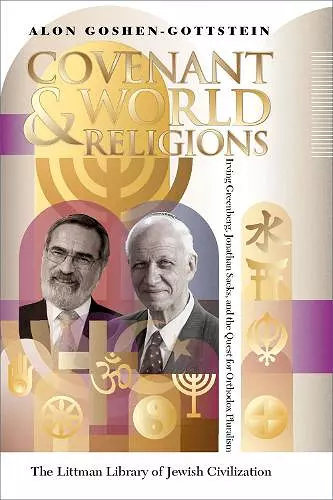Covenant and World Religions
Irving Greenberg, Jonathan Sacks, and the Quest for Orthodox Pluralism
Format:Hardback
Publisher:Liverpool University Press
Published:6th Jun '23
Currently unavailable, and unfortunately no date known when it will be back

Finalist for The Rabbi Sacks Book Prize 2023.
A new paradigm for relations between religions, one of acceptance and collaboration, requires not only a willingness to move beyond a tradition of hostility and competition but also significant theological rethinking. Within Jewish Orthodoxy there have been very few voices that have advanced and justified a vision of other faiths in this light: to this day, the reigning paradigm is one of practical collaboration while avoiding theologically based engagement or reflection. Two of the most important Orthodox Jewish voices advocating change have been those of Irving Yitz Greenberg and Jonathan Sacks. This book presents the theological, moral, and social views of these two leading rabbis. It focuses on the significance of covenant for both, and how they adapt this concept to enable the development of a Jewish view of other religions. In considering how they may have influenced each other, it also studies the limitations and internal contradictions that characterize their work as they attempt to point the way forward, in a spirit of dialogue, to continuing theological reflection on Judaism’s approach to world religions.
‘Alon Goshen-Gottstein is unquestionably one of the leading Jewish practitioners and theorists of inter-faith dialogue. If this book is not yet Goshen-Gottstein’s own Jewish theology of world religions, it is nevertheless an important step towards that goal.’
Paul Franks, Professor of Philosophy, Yale University
‘The time has come to equip contemporary Jews with the tools and analytics for interreligious discourse. This book will help realize this need, developing as it does the dimensions of difference as a major analytic and dialogical feature.’
Michael Fishbane, Nathan Cummings Distinguished Service Professor of Jewish Studies, University of Chicago
‘Written with courage and great learning, this remarkable book argues for the importance of going beyond covenant theology to the notion of all human beings as created in the image of God as a basis for a truly positive relationship between individuals and their religions. It also serves as conspectus of contemporary Orthodox theology. Warmly recommended to all Jews who want to live in, and not only next to, the world around us.’
Menachem Kellner, Chair of Philosophy and Jewish Thought, Shalem College, Jerusalem
‘Alon Goshen-Gottstein is one of the leading contemporary Jewish scholars and practitioners of interreligious dialogue. In this book he offers profound analysis and insight into the writings and thought of two of the most notable rabbinic personalities to emerge from Modern Orthodoxy. He highlights their commonalities and distinctions in a manner that provides much stimulation and enrichment, as well as providing a challenge ahead for Jewish theology.’
Rabbi David Rosen, KSG CBE, International Director of Interreligious Affairs, American Jewish Committee
‘We have here a detailed analysis of the thought of two renowned rabbis and theologians on the challenges faced by Orthodox Judaism in relating to other world religions. As a leader in interfaith work and an outstanding scholar in the field, Goshen-Gottstein is uniquely suited to tackle this provocative and timely topic.’
Marc Shapiro, Weinberg Chair in Judaic Studies, University of Scranton
‘This probing, respectful, and critical study articulates a pluralistic understanding of Judaism rooted in empathetic listening, personal friendships, and mutual theological cross-fertilization. Exceptionally clear and precise, this work is an excellent tool for those interested in interreligious dialogues.’
Hava Tirosh-Samuelson, Lowe Professor of Modern Judaism, Arizona State University
‘The reader who perseveres through Goshen-Gottstein’s volume will be amply rewarded, both with understanding Greenberg and Sacks more deeply as well as with the blessing of discovering new directions for future Jewish theology. If based on the openness of Greenberg’s and Sack’s thinking, this new theology might be up to the challenges of relating sensitively to other religions, tackling seriously the devilish problem of pluralism, and exploiting the critical role that the old-new concept of covenant can play in 21st-century culture, ethics, and sacred history.’ Eugene Korn, Modern Judaism
ISBN: 9781800348509
Dimensions: unknown
Weight: unknown
490 pages